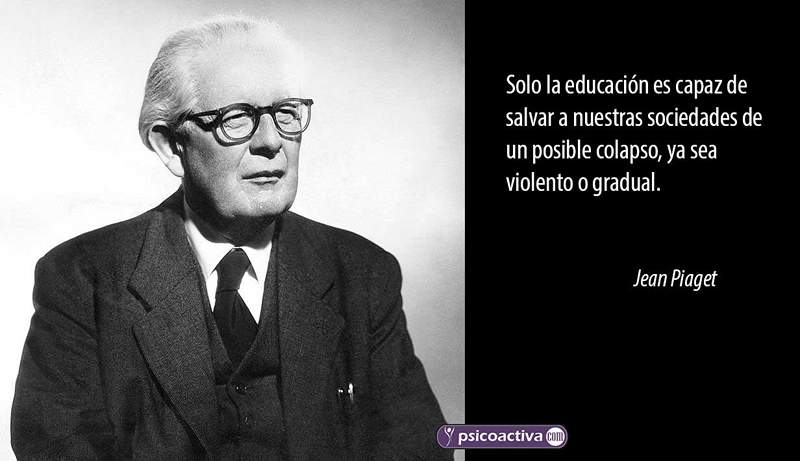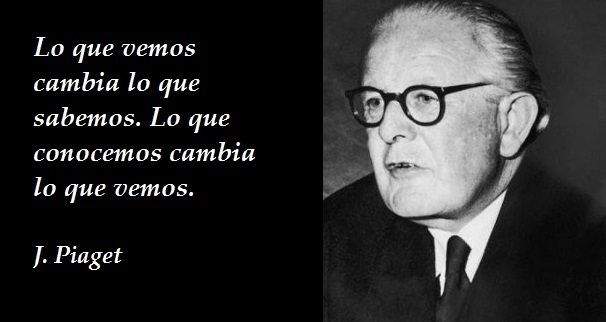Jean Piaget's famous phrases and citations about childhood and education

- 4722
- 1515
- Herbert Ritchie
Jean Piaget (1896-1980), was a Swiss scientist, psychologist and biologist, who worked many years in France, and has been considered the father of genetic epistemology, famous for Piaget's theory and his contributions to the study of childhood and for his Constructivist Development Theory of intelligence. Discover here our fantastic compilation of the best Piaget phrases.
Maybe you are interested: What is constructivism?
Celebres de Jean Piaget quotes
Only education is able to save our societies from a possible collapse, whether violent or gradual.
If an individual is liabilities intellectually, he will not be morally free.
Everything that is taught to a child is prevented from inventing or discovering it.
To express the same idea in another way, I believe that human knowledge is essentially active.
It is with the children with whom we have the best opportunity to study the development of logical knowledge, mathematical knowledge, physical knowledge, among other things.
Knowledge is, therefore, a system of transformations that become progressively adequate.
Intelligence is what you use when you don't know what to do.
The behavior ends when the need is satisfied: the return to balance is then characterized by a feeling of satisfaction.
If you want to be creative, keep in part as a child, with creativity and inventiveness that characterizes children before being deformed by adult society.
Are we forming children who are only able to learn what is already known? Or should we try to develop creative and innovative minds, capable of discovering from preschool age, throughout life?
When you teach a child something, you take away his chance to discover it for himself.
Teaching means creating situations where structures can be discovered.
The more we try to improve our schools, the heavier the teaching task becomes; And the better our teaching methods, the more difficult they will be applied.
Balance is the deepest trend of all human activity.
The main objective of education in schools should be the creation of men and women who are able to do new things, not simply repeat what other generations have done; men and women who are creative, inventive and discoverers, who can be critical, verify and not accept, everything that is offered to them.
The game is the work of childhood.
Scientific knowledge is in perpetual evolution, changes from one day to another.
I have always held any deviation from reality, an attitude that I relate to my mother's poor mental health.

What we see changes what we know. What we know changes what we see.
Our problem, from the point of view of psychology and from the point of view of genetic epistemology, is to explain how the transition is made of a lower level of knowledge at a level that is judged to be greater.
I couldn't think without writing.
Education, for most people, means trying to bring the child to resemble the typical adult of their society ... But for me, education means making creators ... you have to do inventors, innovative, not conformist.
Knowledge cannot be a copy, since it is always a relationship between subject and object.
Possibility ... in the accommodation of sensory-motor intelligence, plays the same role as in scientific discovery. It is only useful to genius and their revelations remain meaningless for unqualified workers.
Understanding is inventing.
Children only have a real understanding of what they themselves invent, and every time we try to teach them too fast, we prevent them from reinventing them.
What genetic epistemology proposes is to discover the roots of the different varieties of knowledge, from their elementary forms, following the following levels, also including scientific knowledge.
Experience precedes understanding.
Each acquisition of accommodation becomes material for assimilation, but assimilation always resists new accommodations.
The essential functions of the mind consist of understanding and invention, that is, in the construction of structures by structuring reality.
What role would books and manuals have in this school? The ideal school would not have mandatory manuals for students, but only reference works that would be used freely ... the only indispensable manuals are what the teacher uses.
Play is the answer to how something new occurs.
We learn more when we are forced to invent.
Relationships between parents and children are, without a doubt, not only those of restriction. There is mutual spontaneous affection, which range from first asking the child acts of generosity and even sacrifice, to the very moving manifestations that are not prescribed in any way. And here, without a doubt, there is the starting point for the moral of the good that we will see in development along with the morality of law or duty, and that in some people completely replaces.
How can we, with our adult minds, know what will be interesting? If you follow the child ... you can discover something new ..
Knowing reality implies building systems in continuous transformation that correspond, more or less, to reality.
This means that no individual logic is strong enough to support the total construction of human knowledge.
In other words, knowledge of the outside world begins with an immediate use of things, while the knowledge of oneself is arrested for this purely practical and utilitarian contact.
Logic and mathematics are nothing more than specialized linguistic structures.
It is much more beautiful to find some humanity than all the rules of the world.
What you want is for the teacher to stop being a speaker, satisfied with the transmission of solutions already prepared. His role should be rather that of an initiative and research stimulating of mentors.
This does not mean that logic is strong enough to support the total construction of human knowledge.
I am convinced that there is no kind of boundary between the living and the mental or between the biological and the psychological. From the moment an organism takes into account a previous experience and adapts to a new situation, that looks a lot like psychology.
Scientific thinking, then, is not momentary, is not a static instance, but is a process.
On the one hand, there are individual actions, such as throwing, pushing, touching, rubbing. These are those individual actions that give rise most of the time to the abstraction of objects.
The punishment makes the autonomy of consciousness impossible.
The second objective of education is to form minds that can be critical, that can verify and not accept everything that is offered. The great danger of today are the slogans, collective opinions, the trends already made of thought. We have to be able to oppose individually, to criticize, to distinguish between what is fine and what is not.
Children require long periods of non -scales game and exploration.
A truth learned is nothing more than a truth in half, while the whole truth must be reconquered, rebuilt or rediscovered by the student himself.
The real interest appears when the self identifies with ideas or objects, when it finds in them a means of expression and becomes a necessary form of fuel for its activity.
The problem of education interests me vividly, because it is my impression that there is much to reform and transform, but I think that the psychologist's role consists above all to provide facts that pedagogy can use, and not to get into his link to give advice.
Subscribe to our YouTube channel
Celebres Psychology phrases

